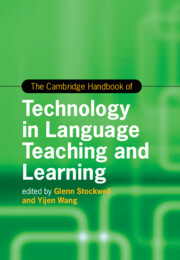Book contents
- The Cambridge Handbook of Technology in Language Teaching and Learning
- Cambridge Handbooks in Language and Linguistics
- The Cambridge Handbook of Technology in Language Teaching and Learning
- Copyright page
- Contents
- Figures
- Tables
- Contributors
- Abbreviations
- Part I Laying the Foundations
- 1 Introduction
- 2 Impact of Context
- 3 Current and Emerging Theories in CALL
- 4 The Shifting Focus of CALL Research
- Part II Environments
- Part III Tools
- Part IV Social Aspects
- Part V Practice
- Part VI Language Skills and Areas
- Glossary
- Index
- References
4 - The Shifting Focus of CALL Research
from Part I - Laying the Foundations
Published online by Cambridge University Press: 15 June 2025
- The Cambridge Handbook of Technology in Language Teaching and Learning
- Cambridge Handbooks in Language and Linguistics
- The Cambridge Handbook of Technology in Language Teaching and Learning
- Copyright page
- Contents
- Figures
- Tables
- Contributors
- Abbreviations
- Part I Laying the Foundations
- 1 Introduction
- 2 Impact of Context
- 3 Current and Emerging Theories in CALL
- 4 The Shifting Focus of CALL Research
- Part II Environments
- Part III Tools
- Part IV Social Aspects
- Part V Practice
- Part VI Language Skills and Areas
- Glossary
- Index
- References
Summary
Early CALL researchers focused primarily on the technical aspects of language learning, such as computer program design and the use of multimedia. However, over time the field has evolved to encompass a wider range of pedagogical and psychological considerations. For example, researchers have investigated the efficacy of different teaching approaches, such as task-based language learning and communicative language teaching through technology. They have also explored the role of learner motivation in technology-mediated language learning, as well as the impact of technology on learners’ attitudes toward language learning. In terms of research design and settings, CALL studies have become increasingly diverse. While early studies often relied on small-scale, laboratory-based experiments, more recent research has taken place in real-world educational settings, such as classrooms and online learning environments using a wider range of research methods, including both quantitative and qualitative approaches. Overall, while there have been significant developments in CALL research over the past four decades, there are still many questions that remain unanswered. As technology continues to evolve, it is likely that researchers will continue to explore new avenues for integrating technology into language education and addressing the challenges that arise along the way.
Information
- Type
- Chapter
- Information
- Publisher: Cambridge University PressPrint publication year: 2025
References
References
Further Reading
This chapter provides an overview of qualitative, quantitative, and mixed-methods approaches used in CALL research, investigating various aspects such as grammar, vocabulary, reading/writing, listening/speaking, pragmatics, intercultural competence, and overall communication skills. The chapter also discusses potential future research directions and methodologies for CALL.
This co-edited book lays the foundation for CALL research. It emphasizes diverse approaches and the involvement of researchers, teachers, and students in exploring computer-enhanced language learning. Written by well-known researchers in the field, the book offers an accessible view, additional resources, and suggestions for CALL research. Despite its publication date, its relevance endures, as it addresses current research issues, presents theories, and considers the factors that influence the outcomes. It complements other CALL and research texts, benefiting teachers and researchers situated in various contexts.
This book provides a comprehensive exploration of MALL; the use of terms CALL and MALL is discussed in chapter 2. That chapter also explores the evaluation of research conducted in the fields of CALL and MALL. It emphasizes the complex nature of research, theory, and practice, highlighting what is involved in assessing the effectiveness and impact of these learning approaches. By addressing the challenges and complexities of conducting research in CALL and MALL, this book, and especially its second chapter, sheds insight into the evolving landscape of technology-assisted language learning.
